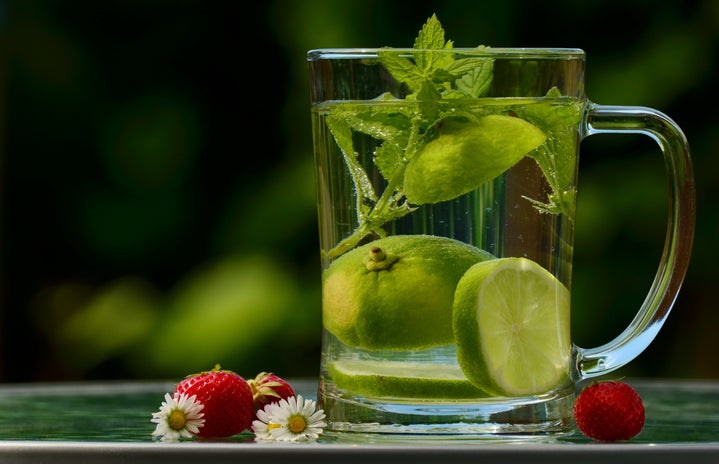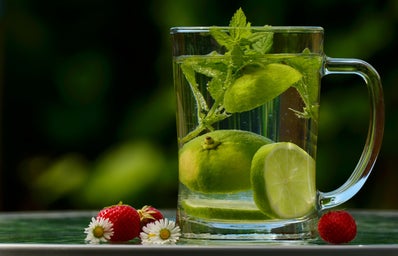With lectures, exams and hangovers to battle, it’s no secret that Miami students drink a lot of coffee and tea on a daily basis. There is almost always an early morning rush of students trying to get their daily coffee fix at any coffee station on campus and even more chaos during the 10 minute breaks between classes. Go to King Café at basically anytime of the day and you’re guaranteed to see someone buying a caffeinated beverage.
“I would say we sell over a thousand espresso and coffee drinks a day,” says Chris Bryant, the assistant manager of King Café. “As far as sales, we do about a million and a half a year. So it’s a busy place. People like their coffee.”
It’s a fast growing habit made trendy by Starbucks and other coffee houses who frequently boast specialty drinks. But is this a healthful habit?
Miami’s dietetics director Gretchen Matuszak said some people are more sensitive to caffeine than others, such as those with acid reflux, Crohn’s disease or heart conditions.
“You know, read the body signs, what are you feeling, [does] your blood pressure feel like it’s going up? Is your heart rate altered as you said? And if you are seeing those signs, then think about cutting back or getting rid of caffeine,” said Matuszak.
But the last thing any of us want to do is cut back, especially not with midterms coming up. For some, starting the day without any caffeine whatsoever is a terrifying thought.
So rather than try to convince you to quit caffeine altogether, we at Her Campus want to explore the health benefits of coffee versus tea. Both beverages receive high praise, but which is the better option for you?
A Little Background About What You’re Sippin On:
According to legend, in 2737 B.C. the emperor of China, Shen Nung, discovered tea when the wind blew tea leaves into his cup of hot water. It then became widely popular in China, and soon all over the world. Today it is the second most widely consumed beverage in the world, after water. Tea is prepared by pouring hot water over the leaves of the Camellia sinensis. It is categorized into four different types, based on the level of oxidation of the leaves:
-
White tea – wilted, minimal oxidation
-
Green Tea – minimal oxidation
-
Oolong tea— oxidized, but less than black tea
-
Black tea – oxidized
Coffee is believed to have originated in East Africa, in Ethiopia, specifically. The legend of coffee begins with a ninth century goat herder named Kaldi, who noticed his goats became hyperactive after eating berries from a certain tree. However, the earliest substantial evidence of coffee drinking or knowledge of the coffee tree dates back to the 15th century in the Sufi monasteries of Yemen. Today coffee is also regarded as one of the world’s most consumed beverages, although it is still behind tea. It is brewed from the roasted beans, or the seeds found inside the berries of the coffea plant.
Health Benefits of Tea:
Due to their low oxidation levels, white tea and green tea are believed to be the most beneficial to our health.
-
Antioxidants: “Antioxidants can prevent inflammation of the blood vessels and it has been linked to reduced risk of cancer,” said David Katz, the medical contributor for Good Morning America. According to the National Cancer Institute, tea contains polyphenol compounds which are antioxidants that may aid in preventing cancers.
-
Fluoride content in tea may help prevent cavities and reduce oral bacteria.
-
Three-five cups per day may help reduce your risk of heart attack.
-
It is said to help reduce stress and work as an anti-depressant.
-
Caffeine benefits!
-
Reputedly beneficial to treat/prevent:
-
Cancer, rheumatoid arthritis, high cholesterol levels, cardiovascular disease, Infection, prostate disease, blood pressure, immunities, Leukemia, Alzheimer’s, and Aids.
-
Cons of Tea:
-
May contain pesticides
-
Contains large amounts of Tannin, which can reduce the absorption of Iron in the body
-
Drinking tea too hot could increase risks of esophageal cancer
-
Negative effects of caffeine
Health Benefits of Coffee:
-
Studies show coffee can help prevent type 2 diabetes.
-
It may help reduce the incidence of dementia or Alzheimer’s.
-
Caffeine benefits
-
Helps protect the liver, especially against cirrhosis and liver cancer.
Cons of Coffee:
-
Can stain teeth, giving them a yellow look
-
High amounts of unfiltered coffee have been linked to higher levels of cholesterol and may increase the risk of heart disease.
-
Can inhibit iron absorption
-
Negative effects of caffeine
Caffeine Content:
As for how much caffeine is in each drink, coffee, whether it is filtered, brewed or instant, has more caffeine than tea. Next up is espresso, and lastly tea. Black tea has the most caffeine out of all the teas, while green and white are significantly lower.
While caffeine can alleviate fatigue and improve concentration and focus, it can also have unpleasant side effects, especially for those who may be more sensitive than others. These negative effects include restlessness, insomnia, muscle tremors, fast heartbeat, upset stomach and nervousness. Caffeine can also cause anxiety, especially in high doses.
So Which Is Better?
So, admittedly, you may now be more unsure of which is better for you than you were before! Honestly, neither one is going to drastically affect you more than the other. You’re probably better off focusing on reducing how much sugars, syrups or creams you’re adding to your drinks than worrying about whether coffee trumps tea or vice versa.
Another key to keeping your caffeinated drinks healthful is moderation. Matuszak recommends no more than one or two caffeinated beverages per day. It is also important to be mindful of how well you handle each beverage. If you suffer from a lot of acid reflux, stomach ulcers or are fairly sensitive to caffeine, you may want to stick with tea.
Above all, get more sleep and use caffeine less. (Cue laughter from every college student.)

